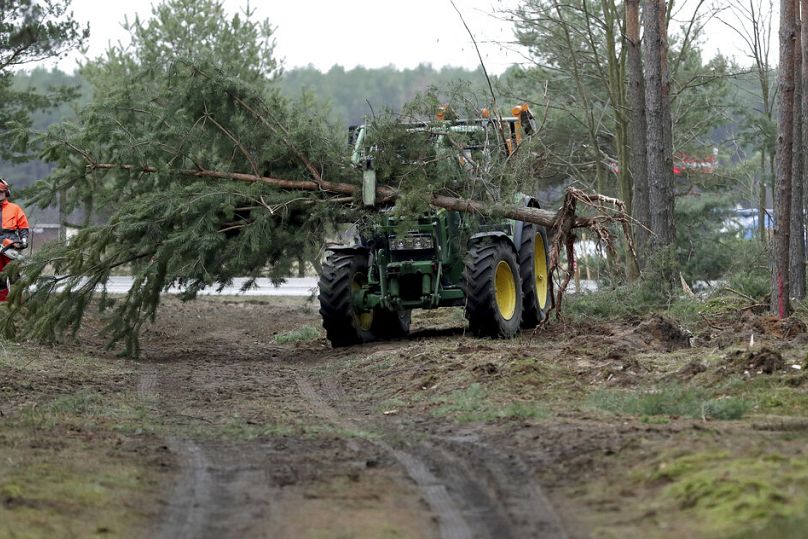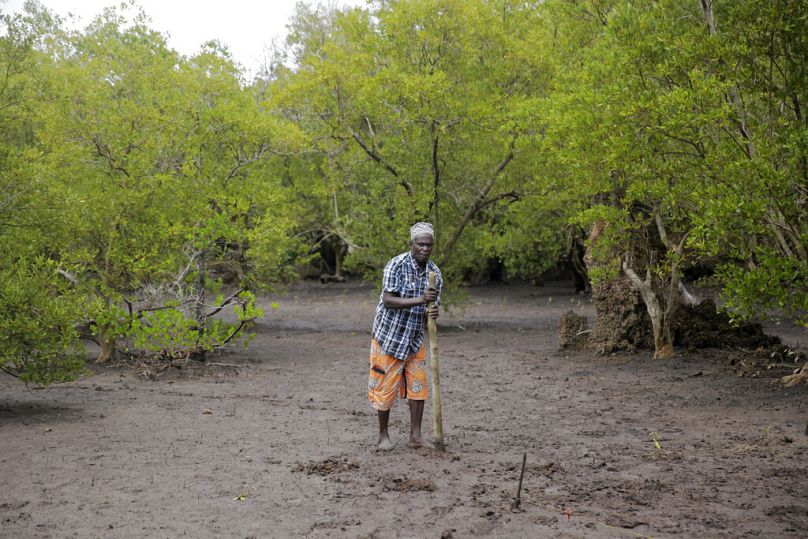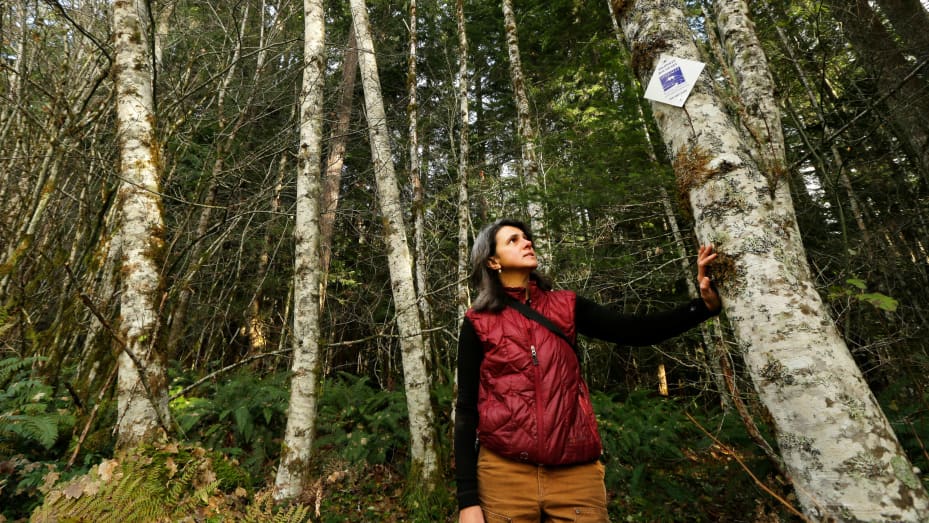By Souparna Lahiri, Senior policy advisor, and Ismail Wolff, Environmental consultant

An aircraft as it takes off at Roissy-Charles de Gaulle Airport, north of Paris,
August 2018 - Copyright AFP/Euronews
The opinions expressed in this article are those of the author and do not represent in any way the editorial position of Euronews.
The European Union’s strategy to turn Europe into the first climate-neutral continent by 2050 is doomed to failure.
Yet, that can be prevented if it rejects the greenwashing of carbon offsetting programmes and shifts policy and finance flows towards genuine climate solutions focused on reducing emissions in line with the science.
The United Nations Intergovernmental Panel on Climate Change (IPCC), charged with advancing scientific knowledge about anthropogenic climate change, is due to release its sixth synthesis report on 20 March, which is expected to indicate there is no further room for offsets.
It shows that by continuing to channel policy focus and financial flows towards mitigation efforts such as carbon offsets and other false solutions — and away from adaptation and the real solutions — we are delaying the immediate emission reduction target by 2030, and we will offshoot 1.5.
The opinions expressed in this article are those of the author and do not represent in any way the editorial position of Euronews.
The European Union’s strategy to turn Europe into the first climate-neutral continent by 2050 is doomed to failure.
Yet, that can be prevented if it rejects the greenwashing of carbon offsetting programmes and shifts policy and finance flows towards genuine climate solutions focused on reducing emissions in line with the science.
The United Nations Intergovernmental Panel on Climate Change (IPCC), charged with advancing scientific knowledge about anthropogenic climate change, is due to release its sixth synthesis report on 20 March, which is expected to indicate there is no further room for offsets.
It shows that by continuing to channel policy focus and financial flows towards mitigation efforts such as carbon offsets and other false solutions — and away from adaptation and the real solutions — we are delaying the immediate emission reduction target by 2030, and we will offshoot 1.5.
Brussels' directive is poised to do more harm than good
The EU is due to publish its Green Claims Directive Proposal next week before it goes to the European Parliament and the European Council as part of the standard legislative process, with it expected to be passed into law before the end of 2024.
The directive is part of the broader 2020 Circular Economy action plan under the EU Green Deal aimed at bringing in EU-wide standards to prevent companies from making false and misleading environmental claims about their products and services.
Euronews Debates: Can the EU Green Deal empower business and consumer change?
European Green Deal: Brussels unveils €1 trillion plan to make EU carbon neutral by 2050
It's also meant to help consumers make informed choices and ensure a level playing field for businesses when marketing their greenness.
The proposed directive includes independent oversight mechanisms to ensure all “green claims” are substantiated and requires member states to ensure enforcement of the new guidelines through new powers for the competent authorities and to establish complaint procedures.
Hundreds of organisations have spoken out against this initiative, arguing that over-reliance on removals to offset ongoing emissions risks no net reductions in emissions.

Simultaneously and as part of the broader Green Deal, the European Commission is also considering a Carbon Removals Certification Framework (CRCF) proposal to regulate offset schemes, which would form part of the assessment of any green claims.
Hundreds of organisations have spoken out against this initiative, arguing that over-reliance on removals to offset ongoing emissions risks no net reductions in emissions.
In fact, it increases the chances of overshooting temperature goals and chances of crossing tipping points and irreversible environmental impacts.
Damage is not undone by doing what is right somewhere else
Simply put, carbon offsets won’t save us. They have been proven a failure and are a barrier to real climate solutions.
It is difficult to see how they would pass a genuine assessment of any claims to the contrary.
Carbon certification companies such as Plan Vivo and Verra cannot be considered independent authorities of the validity of these schemes.
Carbon offsetting is founded on misplaced assumptions of equivalence — that it is possible to trade off destructive practices in one place with positive actions in another.

Multiple investigations and research projects have shown that the vast majority of carbon offset schemes, most of which focus on the planting or conserving of trees to balance out environmentally destructive business practices, simply do not work.
But the voluntary offsets market is a multi-billion euro industry that Verra, Plan Vivo and others will do anything to protect, and they’re now looking into monetising biodiversity.
Carbon offsetting is founded on misplaced assumptions of equivalence — that it is possible to trade off destructive practices in one place with positive actions in another.
But that doesn’t equate to the natural world, where all ecosystems and habitats are unique and are not interchangeable.
Carbon offsetting entrenches inequalities
Carbon trading and offsets have also proven to be ineffective ways of reducing emissions and halting the production of fossil fuels.
It means emissions are still being generated — often by companies in the Global North — not reduced, and offset somewhere else — often in the Global South — allowing companies to continue their unsustainable practices.
These projects are also often responsible for human rights abuses, environmental harms and land conflicts and have gender-differentiated impacts.

A member of Mikoko Pamoja, Swahili for 'mangroves together', plants a mangrove tree at Gazi Bay, in Kwale county, Kenya, June 2022Brian Inganga/www.photoshots.co.ke
These projects are also often responsible for human rights abuses, environmental harms and land conflicts and have gender-differentiated impacts.
They inherently favour those with economic power and tend to further entrench inequalities faced by marginalised groups, including women in all their diversity and Indigenous Peoples.
Research shows that whenever forests become more commercially attractive, for example, through forest carbon offsets markets and plantations, there has been a tendency for forest tenure and access rights — in the rare cases where tenure rights are present — to shift from women to men.
Brussels should listen to reason backed by evidence
Beyond the fact that carbon offsetting is not the answer to climate change, these other important questions on human rights, justice, equity, and local economic, health, and social impacts of these projects require scrutiny.
As such, they should be incorporated into the EU Green Claims Directive and other EU policies on climate change mitigation and adaptation.
Europe has a historical responsibility to support a just transition for the Global South and to rapidly bring emissions down to Real Zero.
It’s time the EU listens to the science, feminist, and climate justice movements along with frontline communities.
Europe must turn its back on false solutions and focus on the real work of halting emissions and conserving and restoring forests and other essential ecosystems.
Souparna Lahiri is Senior Climate and Biodiversity Policy Advisor for the Global Forest Coalition. Ismail Wolff is an independent human rights and environmental consultant.
Updated: 20/03/2023
Major registries in the carbon offset market are allowing dubious credits, report says
Emma Newburger@EMMA_NEWBURGER
CNBC Climate:
KEY POINTS
Major registries in the carbon offset market are systematically over-crediting projects and delivering dubious carbon offsets, allowing some companies to claim more climate benefits than deserved, according to a new report.
A group of researchers led by Barbara Haya, director of the Berkeley Carbon Trading Project, studied nearly 300 carbon offset projects across the world that comprise 11% of all carbon offset credits to date.
Carbon offset projects allow businesses and governments to balance out their own carbon emissions by supporting green initiatives that reduce or sequester an equal amount of carbon pollution.

Paula Swedeen, a forest policy specialist for the Washington Environmental Council, poses for a photo next to a forest land boundary marker adjacent to Mount Rainier National Park on Monday, Nov. 23, 2015, near Ashford, Wash. The land is part of a new project of 520 acres on private timberland that allows the private nonprofit Nisqually Land Trust to sell so-called “carbon credits” to individuals and companies - including Microsoft Corp. - who are hoping to offset their carbon footprints.
Ted S. Warren | AP
Major registries in the carbon offset market are systematically over-crediting projects and delivering dubious carbon offsets, a practice that allows some companies to make unjustified claims of climate progress, according to a new report published Tuesday in the journal Frontiers in Forests and Global Change.
A group of researchers led by Barbara Haya, director of the Berkeley Carbon Trading Project, studied nearly 300 carbon offset projects across the world that comprise 11% of all carbon offset credits to date.
Carbon offset projects allow businesses and governments to balance out their carbon emissions by supporting green initiatives that reduce or sequester an equal amount of carbon pollution. Standards are upheld by groups that have their own registries and are largely unregulated.
The report comes amid repeated concerns over whether carbon offsets are an accurate and effective way to mitigate climate change and greenhouse gas emissions.
Voluntary carbon offset programs have been widely criticized as insufficiently regulated schemes that allow governments and corporations to undermine net-zero emission targets. For instance, some reports suggest that land managers are not changing their logging practices in some forests where offsets were purchased. Officials, researchers and environmental groups have called for stricter standards.
The researchers assessed carbon offset credits from forest management programs, which typically fall into three broad categories: conserving existing forests, boosting forests through processes like reforestation, and changing the management of existing forests to increase carbon sinks in forests.
They found that in the current unregulated market, flexible rules have resulted in a major portion of credits being generated from claims that projects prevent forest carbon loss with large reductions in timber harvesting. Such projects look more similar to conservation or avoided degradation projects than to improved forest management, the report said.
More from CNBC Climate:
The ‘land grab’ for lithium is just getting started with GM deal
Why desalination won’t save states dependent on Colorado River water
Bill Gates: Yes we will overshoot 1.5 degrees Celsius of global warming
“While these baselines might be accurate for some projects with potential for real climate benefit, the flexibility all protocols give can lead to significant over-crediting,” the researchers wrote. They suggested that more conservative baselines can substantially reduce — but not resolve — over-crediting risk.
Three voluntary offset market registries have generated the vast majority of offset credits globally to date: American Carbon Registry, Climate Action Reserve and Verified Carbon Standard, the report said. Each has offset protocols generating credits for voluntary use.
All three are also registries for the California Air Resources Board offset program, and manage the monitoring, reporting and verification processes for offset credits that can be used by the state’s emitters to meet California’s cap-and-trade emissions targets.
Researchers found that the registries did not follow standards to make sure projects have a real and tangible impact on carbon levels or confirm that credits were funding programs that otherwise wouldn’t have occurred.
Emma Newburger@EMMA_NEWBURGER
CNBC Climate:
KEY POINTS
Major registries in the carbon offset market are systematically over-crediting projects and delivering dubious carbon offsets, allowing some companies to claim more climate benefits than deserved, according to a new report.
A group of researchers led by Barbara Haya, director of the Berkeley Carbon Trading Project, studied nearly 300 carbon offset projects across the world that comprise 11% of all carbon offset credits to date.
Carbon offset projects allow businesses and governments to balance out their own carbon emissions by supporting green initiatives that reduce or sequester an equal amount of carbon pollution.

Paula Swedeen, a forest policy specialist for the Washington Environmental Council, poses for a photo next to a forest land boundary marker adjacent to Mount Rainier National Park on Monday, Nov. 23, 2015, near Ashford, Wash. The land is part of a new project of 520 acres on private timberland that allows the private nonprofit Nisqually Land Trust to sell so-called “carbon credits” to individuals and companies - including Microsoft Corp. - who are hoping to offset their carbon footprints.
Ted S. Warren | AP
Major registries in the carbon offset market are systematically over-crediting projects and delivering dubious carbon offsets, a practice that allows some companies to make unjustified claims of climate progress, according to a new report published Tuesday in the journal Frontiers in Forests and Global Change.
A group of researchers led by Barbara Haya, director of the Berkeley Carbon Trading Project, studied nearly 300 carbon offset projects across the world that comprise 11% of all carbon offset credits to date.
Carbon offset projects allow businesses and governments to balance out their carbon emissions by supporting green initiatives that reduce or sequester an equal amount of carbon pollution. Standards are upheld by groups that have their own registries and are largely unregulated.
The report comes amid repeated concerns over whether carbon offsets are an accurate and effective way to mitigate climate change and greenhouse gas emissions.
Voluntary carbon offset programs have been widely criticized as insufficiently regulated schemes that allow governments and corporations to undermine net-zero emission targets. For instance, some reports suggest that land managers are not changing their logging practices in some forests where offsets were purchased. Officials, researchers and environmental groups have called for stricter standards.
The researchers assessed carbon offset credits from forest management programs, which typically fall into three broad categories: conserving existing forests, boosting forests through processes like reforestation, and changing the management of existing forests to increase carbon sinks in forests.
They found that in the current unregulated market, flexible rules have resulted in a major portion of credits being generated from claims that projects prevent forest carbon loss with large reductions in timber harvesting. Such projects look more similar to conservation or avoided degradation projects than to improved forest management, the report said.
More from CNBC Climate:
The ‘land grab’ for lithium is just getting started with GM deal
Why desalination won’t save states dependent on Colorado River water
Bill Gates: Yes we will overshoot 1.5 degrees Celsius of global warming
“While these baselines might be accurate for some projects with potential for real climate benefit, the flexibility all protocols give can lead to significant over-crediting,” the researchers wrote. They suggested that more conservative baselines can substantially reduce — but not resolve — over-crediting risk.
Three voluntary offset market registries have generated the vast majority of offset credits globally to date: American Carbon Registry, Climate Action Reserve and Verified Carbon Standard, the report said. Each has offset protocols generating credits for voluntary use.
All three are also registries for the California Air Resources Board offset program, and manage the monitoring, reporting and verification processes for offset credits that can be used by the state’s emitters to meet California’s cap-and-trade emissions targets.
Researchers found that the registries did not follow standards to make sure projects have a real and tangible impact on carbon levels or confirm that credits were funding programs that otherwise wouldn’t have occurred.
PUBLISHED TUE, MAR 21 20235:
No comments:
Post a Comment